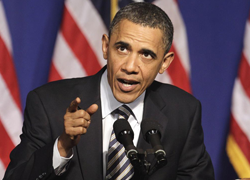President Barack Obama is currently intensifying talks with Colombia, Panama and South Korea regarding proposed free trade agreements (FTA) inherited from the Bush Administration. The President hopes to submit all three agreements to Congress by the end of the year. Worrisome is that similar provisions granting substantial investor rights as those written in precursor agreements, such as NAFTA and CAFTA, are included within each of the prospective pacts, which threaten the public good of the international community.
Within the last 15 years, there has been an explosion of bilateral and multilateral FTAs around the world. Proponents of trade agreements argue that such pacts are valuable tools for increasing foreign investment, promoting fair competition and encouraging transparent regulations. However, in order to encourage investments by foreign multinational corporations in signatory nations, FTAs incorporate investor protection provisions that defy public interest policy by bypassing domestic regulations. Specific provisions included in FTAs that are particularly damaging to the public interest include: (1) provisions that provide for “expropriation and compensation” to investors when the investor feels that the host nation has breached its duties under the FTA; and (2) provisions that contain relaxed regulations regarding nationality requirements for investors wishing to bring arbitration claims against signatory nations.

A good illustration of the risks posed by state-investor enforcement terms is apparent in Pac Rim Cayman LLC v. Republic of El Salvador, which is currently pending before a CAFTA arbitration panel. The Canadian mining company, Pacific Rim, sought to establish “El Dorado”, a gold mine in El Salvador’s largest watershed, the Rio Lempa, which flows not only through El Salvador but also through the neighboring countries of Guatemala and Honduras. Pacific Rim planned to use appalling amounts of water and cyanide to extract gold from the ore it plans to excavate.
Within the most densely populated country in Latin America, over 96% of the surface water in El Salvador is contaminated and 1.5 million people, a quarter of the population, lack access to clean water. The threat of gold processing chemicals leaking into the Rio Lempa would affect thousands that rely on the Rio Lempa for clean water and farming to meet their basic needs. Staunch local activism against the exploitation of Pacific Rim’s proposed gold mine prompted the Salvadoran Government to investigate and eventually refuse to issue an exploitation permit that would allow the establishment of “El Dorado”.
In 2008, the Salvadoran President, Elias Antonio Saca, announced that El Salvador would not grant any exploitation permits until the government modernized current mining laws, in addition to critically analyzing the environmental impact of proposed mines. That same year, Pacific Rim ceased exploratory drilling, and the Canadian-based mining company changed its course of action. Aware that El Salvador became a signatory nation to CAFTA, Pacific Rim chose to reincorporate one of its subsidiaries, Pac Rim Cayman LLC, to Nevada. With a subsidiary now incorporated within the United States, Pacific Rim seized the opportunity to forum shop, thus permitting the corporation to file suit against El Salvador under CAFTA’s investor-state enforcement provisions. Specifically, Pac Rim is claiming that by denying the mining permit, El Salvador expropriated any future earnings and therefore demanded hundreds of millions in compensation for possible losses in future earnings.
Thus, a legitimate fear surrounds the notion that if investor claims succeed, such as those brought by Pac Rim against El Salvador, signatory governments of FTAs with strong investor-state enforcement terms will avoid implementing new laws that promote the public interest in fear of owing millions to foreign corporations through arbitration claims brought under the FTA. The risk, therefore, is the long term, detrimental impact that investor rights have when incorporated into FTAs, preventing domestic policy change that aim to protect the ecosystem or further public health and human rights initiatives. With the price of gold now soaring, numerous foreign mining investors have filed for expropriation permits in El Salvador alone. Irrespective of the arbitration panel’s decision in Pacific Rim Cayman, El Salvador, one of the hemisphere’s poorest nations, will be forced to pay millions to defend itself against investor to uphold policy that protects indigenous rights, public health and the environment.
Congress cannot simply ignore the negative impact investor-state enforcement terms have once applied in international tribunals. The United States – Korea FTA creates an additional component that is relevant to this discourse. Unlike U.S. pacts with developing nations, South Korea, like the U.S., is a major capital exporter. South Korea has 85 multinational companies with over 250 establishments operating in the United States. Lori Wallach, director of Public Citizen’s Global Trade Watch, stated that under the proposed U.S.-Korea FTA, “Korean firms operating [in the U.S.] would get new rights to skirt [the U.S.] court system and laws and use foreign tribunals to demand taxpayer compensation for laws that they do not like, just like Pac Rim is doing to El Salvador.”
The United States must take note of the lessons exposed through previously arbitrated and currently pending cases that elucidate the danger of increased investor-rights in FTAs before it ratifies future trade agreements that defy the greater public good. Congress must implement changes to state-investor enforcement terms to ensure that FTAs comport with the minimum standards of international customary law.


